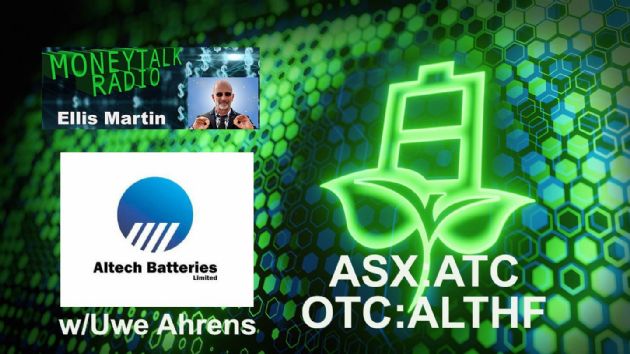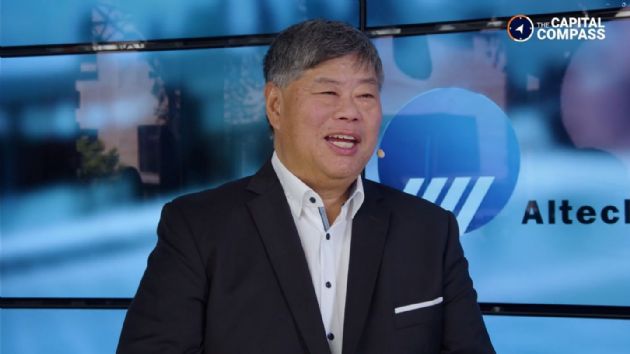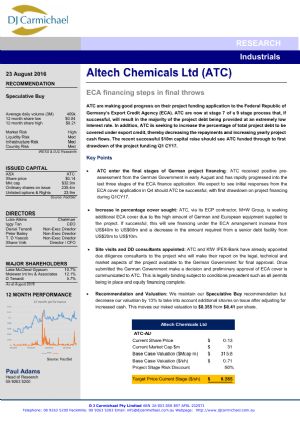
Silumina Anodes DFS Additional Information
Perth, Jan 11, 2024 AEST (ABN Newswire) - Altech Batteries Limited ( ASX:ATC) (
ASX:ATC) ( A3Y:FRA) (
A3Y:FRA) ( ALTHF:OTCMKTS) provides additional information in relation to the announcement on 21 December 2023 of the Definitive Feasibility Study (DFS) for an 8,000tpa (120 GWh) alumina-coated metallurgical silicon plant envisaged for Saxony, Germany.
ALTHF:OTCMKTS) provides additional information in relation to the announcement on 21 December 2023 of the Definitive Feasibility Study (DFS) for an 8,000tpa (120 GWh) alumina-coated metallurgical silicon plant envisaged for Saxony, Germany.
1. PROJECT FINANCING
Altech has embarked on a preliminary multi-faceted financing process based on a grant applications, debt and green bond financing process.
Grant Process
Saxony State Government Grants
- State employment grants for a total maximum sum of EUR7.48M. Federal German Government Grants
- Environmental and/or Federal Technology Grants or R&D Grants up to EUR15M provided through Kreditanstalt fur Wiederaufbau KfW.
- Federal investment funding for special projects referred to as 'Resilience and Sustainability of the Battery Cell Manufacturing Ecosystem' up to EUR50M provided through KfW with a 50% government guarantee.
European Government Grants
- Important Project of Common European Interest (IPCEI) for not less than EUR50M that involves a projection of a potential build up until 2030. This application has been made and will only become accessible for expansion of capacity beyond the 8,000 tpa capacity.
Debt Process
Altech has been in discussion with European banks for debt financing of the Silumina Anodes TM project, including the European Investment Bank (EIB). EIB specialises in zero valley special economic zone for projects of competitive importance.
Green Bond Financing
CICERO has provided a rating of "Medium Green" to the Silumina Anodes TM project. This evaluation, formally termed a 'Green Bond Second Opinion', confirms that the project is suitable for future green bond financing. Altech is in the process of considering debt via the green bond capital market and has advisers working on this process.
NDAs with Potential Customers
Altech has executed non-disclosure agreements (NDAs) with prominent automotive conglomerates in Europe and the United States, that have shown keen interest in Altech's Silumina AnodesTM technology.
NDAs have been executed with two German automakers, two US automakers, one US battery materials supply company, and one European battery maker. Altech will seek to secure offtake agreements with these potential strategic customers once commercial samples can be provided.
2. OPERATING COSTS BREAKDOWN
The total operating costs is estimated to be EUR222.4 million per annum at the full production rate. The operating costs breakdown per kilogram is shown in link below*.
3. SENSITIVITY ANALYSIS
A sensitivity analysis of the Silumina Anodes TM project, prepared at +/- 15%, is provided in the table* in link below.
Using these sensitivities, the analysis indicates that the project is most sensitive to the final product price followed by operating costs. The capital costs have a limited impact on the project returns. The majority of the capital and operating expenses are quoted in euros, and as such, there is minimal impact on the euro NPV of the project if there is a change in the EUR:USD exchange rate.
4. LIFE OF THE PROJECT
The life of the project, as reflected in the financial model, is thirty (30) years, being typical of chemical processing plants. With regular maintenance and sustaining capital every year, these chemical plants often last beyond 30 years. The model assumes annual sustaining capital expenditure of 2.5% per annum of the initial plant buildings and equipment cost over the life of the project.
5. CO2 FOOTPRINT ASSESSMENT
A CO2 footprint assessment of the proposed 8,000tpa plant determined that, when compared to the incumbent lithium-ion battery technology that uses a graphite-only anode, coated silicon anode material could result in a CO2 emissions reduction of ~35% when 10% coated silicon is used in a battery anode, and a reduction of up to ~ 52% if 20% coated silicon was used (refer Table 1* below). Additional calculation details are attached in Table 2*.
6. EXPLANATION OF EIGHTFOLD EXPANSION
During the preparation of the Silumina Anodes TM project DFS, the project's output expanded by eightfold, increasing the capacity from 15 gigawatt-hours (GWh) to 120 GWh, all within the same plant and equipment requirements. In the previous PFS, the production of alumina-coated silicon, which is the active ingredient, was 1,000 tpa. In the DFS, this is now 8,000 tpa. By increasing the production of the active ingredient silicon, the impact on the capacity to the battery industry is now eightfold, as the previous graphite production had a neutral impact on the battery density increase. Also refer to the ASX announcement dated 14 November 2023 for further information in relation to the expanded increase in capacity.
7. SILICON SUPPLY
For silicon supply, Altech has a MoU with Ferroglobe Innovation S.L. (Ferroglobe), a leading producer of high-purity metallurgical silicon in Europe. The executed non-binding MoU details the relationship whereby Ferroglobe would supply silicon anode material to the Silumina Anodes TM battery material plant in Saxony. Ferroglobe is a leading producer of silicon metal, accounting for 14% of the global production capacity. Ferroglobe have 26 electrometallurgy production centers and mine sites on four continents with 69 furnaces worldwide. Last year Ferroglobe produced a total of 328,160 tonnes of silicon metal from Spain, France, North America and South Africa. The grade of the silicon required by Altech is one of Ferroglobe's standard product grading at 99.9% Si grade with a particle size of 0.5 um.
Ferroglobe have indicated that they are capable of supplying the 8,000 tpa required for the project.
8. DFS PROJECT RISKS
The following sections discuss the major risks associated with the success of the Silumina AnodesTM project.
Silumina AnodesTM product fails to perform as expected A fully scaled laboratory has been operating in Perth, Western Australia where Silumina AnodesTM material has been incorporated in half cell lithium-ion batteries and undergoing long term cycling trials.
Testing to date shows at least 30% increase in energy capacity for the anode materials. Early testwork also shows a doubling of the energy capacity. Full cell batteries and pouch cell batteries will also be used to undertake battery performance trials. Altech is confident that the product will ensure higher energy anode materials. Independent battery performance has also been undertaken during the DFS period using Fraunhofer Institute of Germany. The results of this independent testwork have validated the early laboratory testwork conducted in Perth.
To permit further, larger scale independent Silumina AnodesTM testing, Altech has designed and nearly completed construction of its research plant in Saxony, Germany. The research plant will produce larger product samples that can undergo qualification trials with potential customers. This plant also incorporates an onsite laboratory, capable of completing preparation of test cells to validate the larger scale production. The onsite laboratory is now operational and conducting testwork based on techniques and procedures developed in the Perth Laboratory. This test work provides three independent laboratories, all confirming the production process and the results of the Silumina AnodesTM test cells.
Sales achieving 8,000tpa Silumina AnodesTM material
If Altech is not able to sell all it stated capacity of 8,000tpa at desired prices, it will affect the profitability and pay back of the project. Altech will use the research plant in Saxony in order to produce larger product samples that can undergo qualification trials with potential customers. Altech has executed Non-Disclosure Agreements (NDAs) with German automakers as well asa European battery producer.
The plan is to produce commercial samples for these three groups as well as potential long-term customers. The longer-term plan is to convert these interests to off take agreements for total output required for financing. The global demand for battery graphite, silicon, and graphite substitution by silicon engineered products is forecast to grow at accelerating rates from 2023 through 2035. Altech's Silumina AnodesTM product is tailored to suit the silicon engineered product market which is forecast to peak at 80,000 tpa by 2032.
Increased competitiveness of competitors
Altech appears to be one of the early movers to market with an alumina-based silicon product and there appears to be limited competitors in this space. To protect its intellectual property, Altech has patent applications pending in Europe, USA and Australia. Altech has not disclosed to any party, not bound by Contract or under Confidentiality agreements, its formulation and coating process for silicon and graphite with alumina.
Financial Related Risks
Macro-economy control leads to financing difficulties. Current global banking industry and equities market is difficult due to the Ukraine crisis. This change in geo-economic conditions could lead to project finance difficulties for the project. Due to the relative small capital costs of EUR112.5 million, and due to the interest in businesses relating to EV batteries, Altech believes that the project could be funded by pure equity. Due to Silumina AnodesTM being a new product, any debt process will be held up by product risk uncertainties. Any grants achieved by the project via Saxony state government and EU grants will reduce the equity requirements. Any offtake with a name auto company will make equity funding quite achievable.
Lack of Future Capital Raising to Commence Execution
The Company has a clear development plan, clear marketing and engagement strategy, and constant news flow as a lead up to next capital raising. Based on the robust DFS results, the Company is confident that it will be able to raise the project funding and to roll into project execution.
Operational Related Risks
Feedstock supply risk
A Memorandum of Understanding (MoU) has been executed by Altech with a European based supplier of lithium-ion battery grade anode materials. For silicon, AIG and Altech has a supply MoU with Ferroglobe Innovation S.L. (Ferroglobe), a leading producer of high purity metallurgical silicon in Europe. The executed non-binding MoU details the relationship whereby Ferroglobe would supply silicon anode material to the AIG Silumina AnodesTM plant in Saxony. Ferroglobe is a leading producer of silicon metal with a proven ability to create new solutions and applications using state-of-the-art technology to drive innovation. It has technologies to produce high purity grade silicon and is specifically developing tailor made silicon powders for the anode of lithium-ion batteries.
Not achieving plant utilisation rate
If the utilisation target is not achieved in operation, capacity is adversely affected, the unit cost will be higher, impacting the profitability and delaying the achievement of positive cash flow. Altech has designed a very robust plant and considered maintenance and downtime requirements in the plant capacity. The main counter measure for plant failure is conservative utilisation, with the plant designed for 85% overall utilisation. The downtime includes a fortnightly 24-hour preventative maintenance shutdown together with an annual outage of two weeks which accounts for 11% downtime. The design caters for a further 4% for unscheduled shutdowns including loss of power supply. Overall, the risk is managed by a conservative utilisation design and Altech's effective preventative maintenance programs. Furthermore, Altech has plant a slow ramp up over the first two years, with a planned production target of 50% in the first year and 75% in the second year of production, only targeting name plate production in the 3rd year of operation.
Major production throughput bottlenecks
Major production bottlenecks can cause the plant output to be restricted. This restricted capacity results in the unit cost being higher, impacting the profitability and delaying the achievement of positive cash flow. Most plants during start up encounter these bottlenecks. Altech believes that the problem stems from the design phase. Major plant equipment have design factors incorporated however, the process lines, valves, pumps and instruments between these major equipment often miss out on the extra design capacity. Bottlenecks usually occur in between the major equipment items. During the DFS, further engineering has been completed to size primary equipment and to confirm interface equipment concepts and sizes.
Lower purity of Silicon and Boehmite
The feedstock supply of silicon and boehmite are bought supply materials with tight specifications (refer specifications in supply section). The plant will be operated under ISO quality standards which means normal quality monitoring of key supply materials will be part of the quality program.
Packed bed calciner
The coating process of silicon involves mixing with aluminium chloride solution, drying and then calcination at 400 degrees to form an amorphous alumina layer. Altech has chosen to design a calciner to use renewable electricity instead of the conventional natural gas supply. The calciner uses silicon carbide tubes that contain heating elements which heat up when a current is applied. As this piece of equipment is relatively new technology, the equipment will be tested in the recently constructed research plant. Component testing commenced in quarter 4 2023, to validate thermal operation of the new equipment. Results received to date are within Altech expectations. Testing is ongoing and will be comprehensive once the research plant dryer and calciner equipment is fully commissioned.
*To view tables and figures, please visit:
https://abnnewswire.net/lnk/KDWH34Q1
About Altech Batteries Ltd
 Altech Batteries Limited (ASX:ATC) (FRA:A3Y) is a specialty battery technology company that has a joint venture agreement with world leading German battery institute Fraunhofer IKTS ("Fraunhofer") to commercialise the revolutionary CERENERGY(R) Sodium Alumina Solid State (SAS) Battery. CERENERGY(R) batteries are the game-changing alternative to lithium-ion batteries. CERENERGY(R) batteries are fire and explosion-proof; have a life span of more than 15 years and operate in extreme cold and desert climates. The battery technology uses table salt and is lithium-free; cobalt-free; graphite-free; and copper-free, eliminating exposure to critical metal price rises and supply chain concerns.
Altech Batteries Limited (ASX:ATC) (FRA:A3Y) is a specialty battery technology company that has a joint venture agreement with world leading German battery institute Fraunhofer IKTS ("Fraunhofer") to commercialise the revolutionary CERENERGY(R) Sodium Alumina Solid State (SAS) Battery. CERENERGY(R) batteries are the game-changing alternative to lithium-ion batteries. CERENERGY(R) batteries are fire and explosion-proof; have a life span of more than 15 years and operate in extreme cold and desert climates. The battery technology uses table salt and is lithium-free; cobalt-free; graphite-free; and copper-free, eliminating exposure to critical metal price rises and supply chain concerns.
The joint venture is commercialising its CERENERGY(R) battery, with plans to construct a 100MWh production facility on Altech's land in Saxony, Germany. The facility intends to produce CERENERGY(R) battery modules to provide grid storage solutions to the market.
| ||
|












